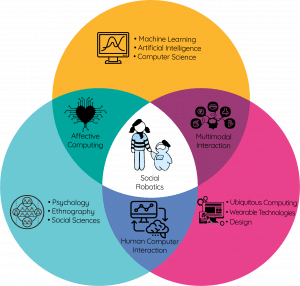In today’s rapidly evolving retail industry, inventory management and logistics play a crucial role in ensuring the success and profitability of businesses. With the advent of artificial intelligence (AI), retailers are now able to streamline their supply chain processes, optimize inventory levels, and enhance logistics efficiency. This article explores the incredible potential of AI in revolutionizing the retail supply chain, and how it can help businesses maintain a competitive edge in an increasingly digital world.

1. AI in Retail Supply Chain
Artificial Intelligence (AI) has revolutionized various industries, and retail is no exception. The integration of AI into the retail supply chain has brought about significant improvements in inventory management, logistics optimization, predictive analytics, robotics in warehousing, supply chain visibility, demand sensing, vendor management, and return management. With AI technologies, retailers can streamline their operations, improve efficiency, enhance customer experience, and ultimately drive profitability.
1.1 Role of AI in Retail
In the retail industry, AI plays a crucial role in automating various processes and decision-making tasks. AI algorithms and machine learning models analyze vast amounts of data, enabling retailers to gain valuable insights and make data-driven decisions. AI-powered systems can also learn from historical data and adapt to changing market conditions, allowing retailers to stay ahead of their competitors.
1.2 Importance of AI in Supply Chain
Efficient supply chain management is vital for retail success, as it ensures that products are available to customers when and where they are needed. AI technologies help retailers optimize their supply chain processes by automating inventory management, demand forecasting, logistics routing, and more. By leveraging AI, retailers can reduce costs, minimize stockouts and overstocks, improve delivery times, and enhance overall customer satisfaction.
1.3 Benefits of AI in Retail Supply Chain
The benefits of AI in the retail supply chain are manifold. By utilizing AI-powered demand forecasting, retailers can accurately predict customer demand and optimize their inventory levels accordingly. This not only helps in preventing stockouts but also avoids costly overstocks.
AI also plays a crucial role in logistics optimization. Route optimization algorithms enable retailers to plan the most efficient routes for deliveries, reducing fuel costs and transport time. AI can also optimize last-mile delivery, ensuring timely and cost-effective delivery to customers’ doorsteps. Furthermore, AI technologies facilitate warehouse management by optimizing storage layouts, improving picking and packing processes, and enabling the automation of routine tasks.
Predictive analytics, another significant application of AI in the retail supply chain, allows retailers to utilize data to make accurate forecasts about customer demand and market trends. By analyzing historical sales data, market insights, and external factors, retailers can proactively respond to changing customer preferences, stock up on popular items, and adjust pricing strategies accordingly.
Lastly, AI technologies in vendor management and return management streamline processes and improve efficiency. AI can assist in efficient vendor selection, intelligent negotiation and contract management, and analyzing supplier performance. Additionally, in return management, AI-enabled systems can automate return authorization processes, ensuring a seamless and improved customer experience.
2. Inventory Management with AI
Inventory management is a critical aspect of retail supply chain operations. Efficient management of inventories helps retailers optimize costs, maintain adequate stock levels, avoid stockouts, and ultimately provide customers with a seamless shopping experience. AI technologies offer significant advancements in inventory forecasting, optimizing inventory levels, preventing stockouts and overstocks, and enabling efficient stock replenishment.
2.1 AI-powered Demand Forecasting
One of the primary challenges in inventory management is accurately predicting customer demand. AI algorithms offer precise demand forecasting capabilities by analyzing historical sales data, market trends, weather patterns, and other relevant factors. Machine learning models can identify patterns and correlations in data that might not be apparent to human analysts, resulting in more accurate forecasts. By leveraging AI-powered demand forecasting, retailers can ensure they have the right amount of stock on hand, reducing inventory holding costs and preventing stockouts.
2.2 Optimizing Inventory Levels
AI enables retailers to optimize their inventory levels based on demand forecasts. By continuously analyzing real-time sales data and historical trends, AI algorithms can determine the optimal quantity of each product to have in stock. Retailers can avoid overstocks, reducing excess inventory carrying costs and the risk of obsolescence. On the other hand, AI systems ensure that retailers maintain adequate stock levels to meet customer demand and prevent stockouts, ensuring customer satisfaction.
2.3 Preventing Stockouts and Overstocks
Stockouts and overstocks are major challenges for retailers – stockouts lead to lost sales, dissatisfied customers, and reputational damage, while overstocks result in increased holding costs and potential losses due to markdowns. AI technologies help retailers mitigate these risks by accurately forecasting demand and optimizing inventory levels. Real-time sales data, market trends, external factors, and machine learning models enable retailers to proactively identify potential stockouts or overstocks and take appropriate actions to mitigate them.
2.4 Efficient Stock Replenishment
AI enables retailers to automate and optimize their stock replenishment processes, ensuring a streamlined and efficient operation. AI algorithms can analyze real-time inventory levels, customer demand, and lead times to determine when and how much to reorder. By automating stock replenishment decisions, retailers can reduce the risk of errors and optimize the use of resources. This not only improves operational efficiency but also enhances customer satisfaction by ensuring products are consistently available.
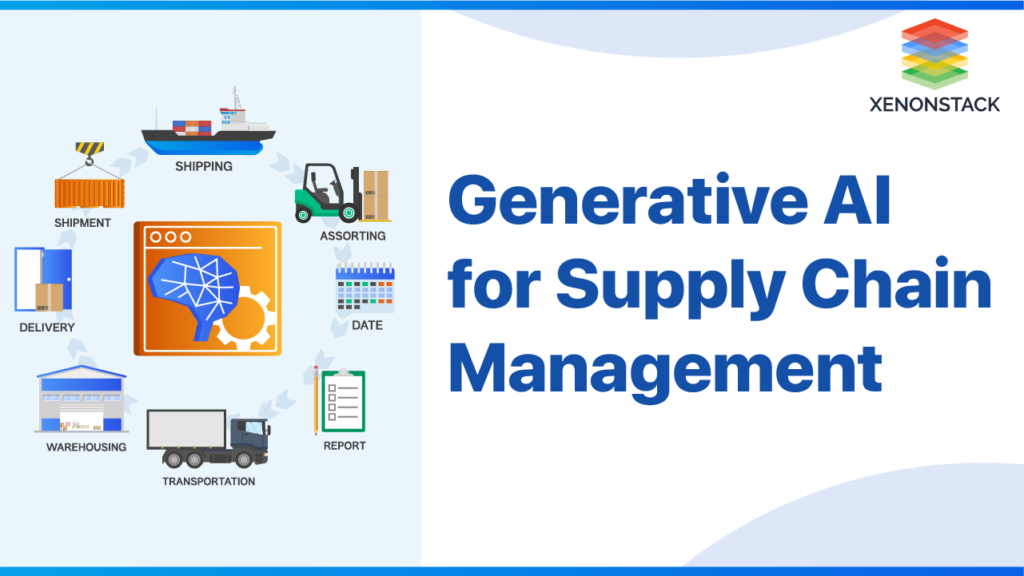
3. Logistics Optimization with AI
Efficient logistics is crucial for retailers to ensure timely and cost-effective delivery of products. AI technologies offer valuable tools for optimizing logistics operations, including route optimization, last-mile delivery optimization, warehouse management, and supply chain visibility.
3.1 Route Optimization
Route optimization plays a significant role in minimizing transportation costs while maximizing delivery efficiency. AI algorithms analyze various parameters such as distance, traffic conditions, delivery time windows, and vehicle capacities to determine the most efficient routes for deliveries. By using AI-powered route optimization, retailers can reduce fuel costs, improve delivery times, and increase the number of deliveries per route, resulting in enhanced operational efficiency and reduced environmental impact.
3.2 Last-Mile Delivery Optimization
The last mile of the delivery process is often the most challenging and expensive. AI technologies help retailers optimize last-mile delivery by considering factors such as real-time traffic conditions, delivery addresses, customer preferences, and available delivery windows. AI algorithms can intelligently allocate delivery tasks to drivers, considering the proximity of deliveries, traffic patterns, and other constraints. By optimizing last-mile delivery, retailers can minimize costs, improve delivery times, and enhance customer satisfaction.
3.3 Warehouse Management
Efficient warehouse management is critical for retailers to ensure timely order processing and accurate inventory control. AI technologies facilitate warehouse management by optimizing storage layouts, improving picking and packing processes, and enabling the automation of routine tasks. AI algorithms can analyze order patterns, product characteristics, and other factors to determine the optimal placement of products within the warehouse, reducing travel time and improving order fulfillment speed. Additionally, AI-powered robotics can assist in automating repetitive tasks, such as picking and packing, further improving efficiency.
3.4 Supply Chain Visibility
Supply chain visibility is essential for retailers to track and manage their inventory throughout the supply chain. AI technologies provide real-time visibility into the movement of goods, from suppliers to warehouses, and from warehouses to stores or end customers. By leveraging AI-powered tracking systems, retailers can monitor inventory levels, manage stockouts, identify bottlenecks in the supply chain, and proactively respond to disruptions. Supply chain visibility offered by AI enables retailers to make more informed decisions, improve operational efficiency, and enhance customer satisfaction.
4. AI and Predictive Analytics
Predictive analytics is a powerful application of AI in the retail supply chain, offering retailers valuable insights into customer behavior, demand forecasts, and optimal supply chain responses. By utilizing historical data and advanced machine learning algorithms, predictive analytics enables retailers to anticipate customer demand, adjust inventory levels, optimize pricing strategies, and enhance overall supply chain performance.
4.1 Utilizing Data for Predictive Analytics
Retailers generate vast amounts of data, encompassing sales transactions, customer profiles, market trends, and more. AI technologies empower retailers to utilize this data for predictive analytics. By applying advanced machine learning models to historical data, retailers can identify patterns, correlations, and trends, and make accurate forecasts about customer demand and market fluctuations.
4.2 Forecasting Customer Demand
Accurate demand forecasting is crucial for retailers to optimize inventory levels, avoid stockouts, and enhance customer satisfaction. Predictive analytics enables retailers to forecast customer demand based on historical sales data, market trends, demographic information, and other relevant factors. By leveraging AI-powered demand forecasting models, retailers can proactively adjust their inventory levels, ensure product availability, and minimize the risk of stockouts and overstocks.
4.3 Enhancing Supply Chain Responses
Predictive analytics enables retailers to not only forecast customer demand but also optimize their supply chain responses. By analyzing historical sales data, market insights, and external factors, retailers can identify patterns and correlations that influence supply chain performance. AI technologies enable retailers to make data-driven decisions, adjust production levels, optimize logistics operations, and anticipate potential disruptions. By utilizing predictive analytics, retailers can enhance their overall supply chain responsiveness, improve operational efficiency, and meet customer expectations more effectively.
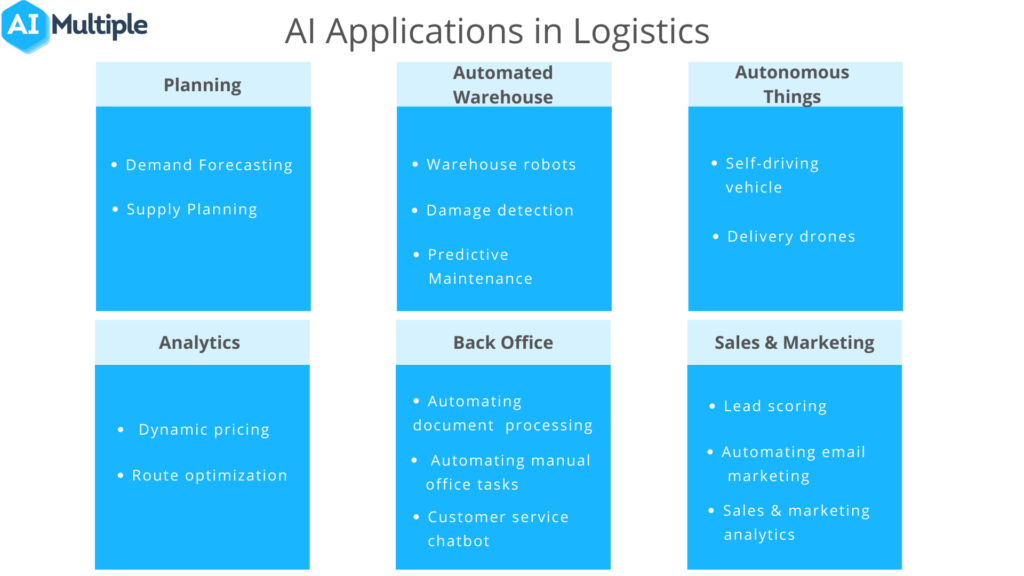
5. AI and Robotics in Warehousing
The integration of AI and robotics in warehousing brings significant advancements in operational efficiency, accuracy, and speed. AI-powered robotics enable retailers to automate warehouse operations, optimize order picking and packing processes, and streamline the overall order fulfillment process.
5.1 Automation of Warehouse Operations
AI-powered robotics offer retailers the opportunity to automate various warehouse operations, such as inventory management, order picking, and packing, and goods movement. Robots equipped with AI algorithms can navigate warehouse environments, retrieve products, and transport them to designated areas. By automating routine tasks and reducing human involvement, retailers can improve operational efficiency, minimize errors, and free up employees’ time for more strategic activities.
5.2 Robotics for Order Picking and Packing
Order picking and packing processes are labor-intensive and time-consuming. AI-powered robotic systems can significantly improve the speed and accuracy of these processes. By utilizing computer vision and machine learning algorithms, robots can identify, retrieve, and sort products for orders, reducing picking errors and increasing order fulfillment speed. Additionally, AI-powered robotics can facilitate efficient packing by optimizing the arrangement of products and minimizing packaging material usage.
5.3 Streamlining Order Fulfillment Process
AI and robotics in warehousing contribute to streamlining the overall order fulfillment process. With AI-powered analytics and automation, retailers can optimize inventory management, reduce order cycle times, and improve the accuracy of order deliveries. By integrating AI-powered robotics with warehouse management systems and logistics networks, retailers can achieve end-to-end visibility and control over the order fulfillment process. This results in improved operational efficiency, reduced costs, and enhanced customer satisfaction.
6. AI and Supply Chain Visibility
Supply chain visibility is crucial for retailers to effectively manage their inventory, identify bottlenecks, and proactively respond to disruptions. AI technologies provide retailers with real-time tracking of shipments, predictive delivery status, and tools for minimizing delivery delays.
6.1 Real-time Tracking of Shipments
Real-time tracking of shipments enables retailers to proactively monitor the movement of goods throughout the supply chain. AI-powered tracking systems utilize sensors, GPS technology, and data analytics to provide precise information about the location, condition, and estimated arrival times of shipments. By leveraging real-time tracking, retailers can ensure visibility into the supply chain, identify potential delays, and take appropriate actions to mitigate risks and enhance operational efficiency.
6.2 Predictive Delivery Status
AI technologies also enable retailers to predict delivery status by analyzing historical data, real-time information, and external factors. By utilizing machine learning algorithms, retailers can accurately estimate the time of delivery, anticipate delays, and provide customers with proactive updates. This improves customer satisfaction by setting the right expectations and ensures timely and reliable deliveries.
6.3 Minimizing Delivery Delays
Delivery delays can have a significant impact on customer satisfaction and cost retailers their reputation. AI technologies help retailers minimize delivery delays by analyzing historical data, traffic patterns, weather conditions, and other relevant factors. By utilizing this information, retailers can optimize logistics operations, proactively identify potential delays, and take appropriate actions to mitigate risks. AI-powered route optimization and predictive analytics enable retailers to deliver products on time, ultimately enhancing customer satisfaction and loyalty.
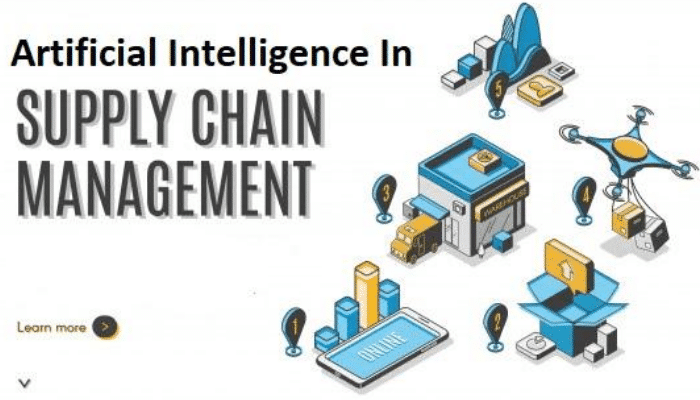
7. AI and Demand Sensing
Demand sensing, or the ability to accurately and quickly sense changes in customer demand, is crucial for retailers to stay competitive in dynamic markets. AI technologies enable retailers to analyze customer behavior, respond to dynamic market demands, and improve product availability.
7.1 Analyzing Customer Behavior
AI-powered analytics enable retailers to analyze customer behavior and preferences by leveraging data from various sources, including sales transactions, browsing patterns, social media, and loyalty programs. By applying machine learning algorithms to this data, retailers can identify patterns, trends, and correlations, enabling them to understand customers’ needs and preferences better. This valuable insight allows retailers to tailor their offerings, optimize pricing strategies, and develop personalized marketing campaigns.
7.2 Responding to Dynamic Market Demands
Market demands are continuously changing, influenced by factors such as seasonality, trends, competitors’ actions, and economic conditions. AI technologies enable retailers to respond to these dynamic market demands by analyzing real-time sales data, market trends, and external factors. By utilizing machine learning algorithms, retailers can quickly adapt their inventory levels, adjust pricing strategies, and optimize the allocation of resources. This enables retailers to seize market opportunities, avoid stockouts or overstocks, and better meet customer demands.
7.3 Improving Product Availability
Product availability is crucial for retailers to retain customers and maximize sales. AI technologies help retailers manage product availability by accurately forecasting demand, optimizing inventory levels, and aligning supply chain operations accordingly. By precisely understanding customer demand patterns, retailers can ensure the right products are in stock, reduce the risk of stockouts, and enhance overall customer satisfaction. Improved product availability translates into increased sales, customer loyalty, and a competitive advantage in the market.
8. AI in Vendor Management
Vendor management is a crucial aspect of retail supply chain operations. AI technologies facilitate efficient vendor selection, intelligent negotiation and contract management, and analyzing supplier performance.
8.1 Efficient Vendor Selection
AI technologies enable retailers to analyze vast amounts of data related to potential vendors, including factors such as price, quality, reliability, and past performance. AI algorithms can automate the vendor selection process by evaluating these factors systematically and identifying the most suitable vendors. By leveraging AI in vendor management, retailers can make informed decisions, minimize risks, and establish long-term partnerships with reliable suppliers.
8.2 Intelligent Negotiation and Contract Management
Negotiating contracts with vendors and managing supplier relationships require careful analysis and negotiation skills. AI technologies empower retailers to intelligently negotiate and manage contracts by analyzing historical data, market conditions, and business objectives. Machine learning algorithms can identify patterns, compare proposed terms with historical data, and provide retailers with insights to make informed decisions. AI-based contract management systems also enable retailers to automate contract generation, track compliance, and manage ongoing supplier relationships efficiently.
8.3 Analyzing Supplier Performance
AI technologies enable retailers to assess supplier performance by analyzing various factors, such as on-time delivery, product quality, and responsiveness. By leveraging machine learning algorithms, retailers can track and analyze data related to supplier performance, identify patterns, and make data-driven decisions regarding supplier relationships. Real-time monitoring of supplier performance allows retailers to address issues promptly, improve supply chain efficiency, and maintain high-quality standards.
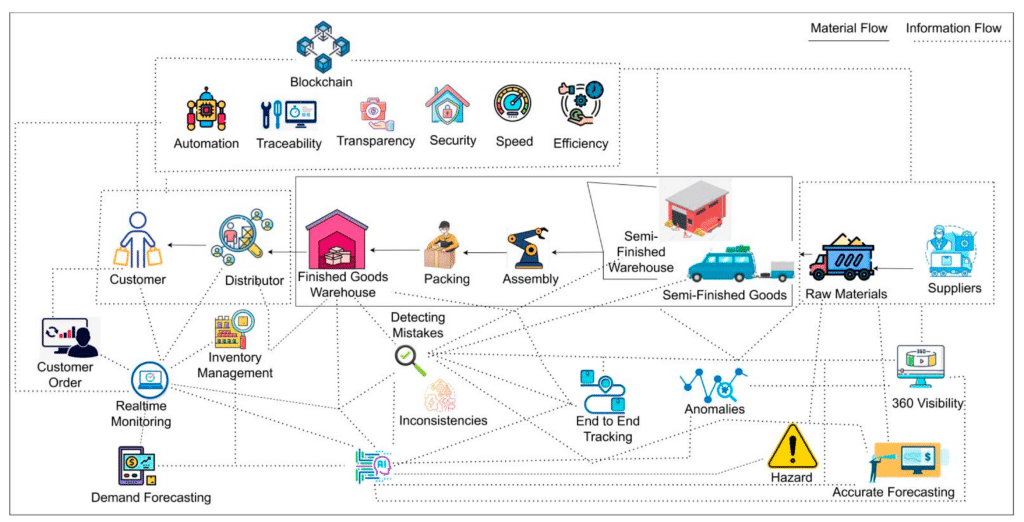
9. AI and Return Management
Return management is an essential aspect of the retail supply chain, as it directly impacts customer satisfaction and operational costs. AI technologies help retailers streamline return processes, automate return authorizations, and improve the overall customer experience.
9.1 Streamlining Return Processes
Return processes can be complex and time-consuming for both retailers and customers. AI technologies facilitate the streamlining of return processes by automating various tasks, such as return request classification, return routing, and return verification. By utilizing machine learning algorithms, retailers can analyze return data, identify patterns, and proactively address potential issues. Streamlining return processes not only improves operational efficiency but also enhances customer satisfaction by providing a hassle-free return experience.
9.2 Automated Return Authorization
Return authorization is a critical step in the return management process, ensuring that only eligible returns are accepted. AI technologies enable retailers to automate the return authorization process by analyzing return data and predefined return policies. By utilizing machine learning algorithms, retailers can accurately determine the eligibility of returns, reduce the risk of fraud and abuse, and provide a faster and more consistent return experience for customers.
9.3 Improved Customer Experience
AI-powered return management systems contribute to an improved customer experience by providing faster, more efficient, and hassle-free returns. By streamlining processes, automating tasks, and ensuring accurate return authorizations, retailers can reduce customer effort and frustration. Improved return management not only enhances customer satisfaction but also fosters customer loyalty and positive brand perception.
10. Challenges and Limitations of AI in Retail Supply Chain
While AI brings numerous benefits to the retail supply chain, it also presents several challenges and limitations that need to be considered.
10.1 Data Quality and Availability
The effectiveness of AI systems relies heavily on the quality and availability of data. Retailers need to ensure that their data is accurate, complete, and up-to-date for optimal AI performance. However, data quality and availability can be challenging, especially when dealing with multiple data sources, legacy systems, and incomplete or inconsistent data. It is essential for retailers to invest in data management and data governance practices to ensure the reliability of their AI systems.
10.2 Integration and Compatibility
Integrating AI technologies into existing retail systems and processes can be a complex task. AI solutions often require seamless integration with various data sources, software applications, and hardware components. Compatibility issues between different systems and legacy infrastructure can pose challenges to the successful implementation of AI in the retail supply chain. Retailers need to carefully plan and execute the integration process to ensure a smooth transition and avoid disruption to existing operations.
10.3 Ethical Considerations and Privacy
AI technologies in the retail supply chain raise ethical considerations and privacy concerns. The collection and analysis of vast amounts of customer data can raise questions about data privacy, consent, and transparency. Retailers must ensure compliance with relevant data protection regulations and establish ethical frameworks for the use of AI in their operations. Transparent communication with customers about data usage and ensuring robust security measures are crucial to maintaining trust and protecting customer privacy.
In conclusion, AI technologies have transformed the retail supply chain by enabling efficient inventory management, logistics optimization, predictive analytics, robotics in warehousing, supply chain visibility, demand sensing, vendor management, and return management. By leveraging AI, retailers can enhance operational efficiency, improve customer experience, optimize costs, and gain a competitive edge in the dynamic retail industry. Despite the challenges and limitations, the potential benefits of AI in the retail supply chain make it a valuable investment for retailers to consider.

